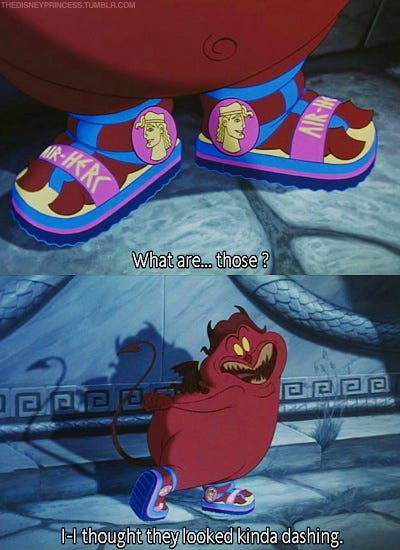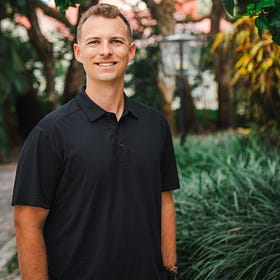All the famous people I know
Don't let the influencers influence you! PLUS: Ancient cultic practices, Disney's Hercules, and celebrity worship self-reflection questions.
I can’t say I’ve had many celebrity encounters in my life—at least, not with the kind of people “average” folks know.
My run-ins with celebrities are typically those popular in niche Christian spaces. I was in a Slim Chicken’s once with the Skit Guys (a few tables over). I’ve had lunch with a member of the Green family, the people behind Hobby Lobby and the Museum of the Bible. I’ve shaken hands with several big names in the Christian apologetics world, including Lee Strobel. And then there are a few super-cool biblical scholars I’ve met and engaged in lengthy conversations with, such as Scot McKnight.
I suppose my biggest “claim to fame” is probably being three degrees away from Kevin Bacon. I acted in a film my brother and I made, and my brother’s roommate once met Kevin Bacon at a theater… so we’ll count it as following Bacon’s Law!
[BTW I would love to hear your celebrity encounter stories in the comments below!]
The truth is, it felt pretty good name-dropping all the people I’m associated with—even if most of them are only famous within certain circles. It makes me feel cool to tell you a fact like the current mayor of Oklahoma City follows me on X (formerly Twitter), or that I once introduced the future Secretary of State of Oregon at a fundraising dinner when he was running for governor. It makes me popular “by association.” It makes me seem important to be connected to other important people.
I am under no illusion that I am any kind of celebrity, despite having written some books and having a couple hundred readers who open this email weekly. Sometimes, however, I dream about it. I wouldn’t mind a little paparazzi, a kid asking for my autograph in a restaurant, or a fan club or two.
Perhaps the celebrity lifestyle isn’t your cup of tea. But more than likely, you probably have a celebrity or two (or 17) whom you admire. An athlete, pop star, actor, speaker, thinker, or podcaster—there’s likely someone out there you don’t really know who has some influence and an audience, and you can’t help but admire them. Something about them and the way they do things draws you in.
I’m sure there is some name coming to mind because as 21st-century members of a global society where media is everything, we like celebrities—sometimes a bit too much.
The Gods Among Us
A throwaway line on a podcast recently caught my attention: the hosts compared the ancient practice of god and demigod worship to our modern fascination with celebrities. Both ancient gods and modern celebrities are seen as larger than life, something so unattainable. Certain cultic practices and rituals would build around them, especially in polytheistic contexts—a bunch of people in Ephesus would go all-in on the Artemis cult in a way not so different from someone becoming a Swiftie and attending multiple Eras tour shows.
Ancient cults surrounding a particular deity—whether Artemis, Ra, or Ishtar—demanded devotion to that god over others and often imposed lifestyle expectations, such as being a perpetual virgin. Our modern celebrities develop their own little cultic followings with the way we hang on their opinions (even on topics they know nothing about), buy their products, watch every movie they star in (no matter how poorly written), or mold our lifestyles to mimic theirs. I’ve definitely seen “cults” pop up around figures like Elon Musk, Taylor Swift, Jordan Peterson, Kim Kardashian, and Andrew Tate, just to name a few!
Though historically inaccurate in too many ways to count, Disney’s Hercules humorously illustrates this by overlaying modern merchandising practices onto ancient heroic worship. After saving the day from monsters, Hercules gets a product line, including custom cups and shoes. He goes from zero to hero, so to speak, gaining fans along the way. Of course, Disney’s version ignores the actual myth, where his semi-divine nature alone (rather than some good character traits) makes him impressive. He’s a celebrity because he’s divine—not an ordinary guy.
While social media and podcasts make it seem like we aren’t far from celebrities, what makes these people compelling is that they occupy a different category and class. There is distance, even if you’ve seen their bedroom on TikTok or heard their voice weekly on a podcast. An acquaintance of mine would call influencers she followed on Instagram her “friends,” saying things like, “I wonder what my friends are up to today?” But the truth is, a celebrity isn’t your friend. If they were, they would cease to be a celebrity. They wouldn’t be “special.”
The otherness of the celebrity is what’s so alluring. They seem to have everything we want—the ideal life. They tap into our deepest desires to be known, comfortable, and accomplished. Their god-like status commands our attention and, occasionally, our wallets.
Open any media app, and you’ll see that celebrities dominate all forms of media. They are our modern gods, the ones we turn to for guidance and help. Celebrity opinions from tweets, press tours, and Instagram captions become front-page stories. They blur the lines between ad and content in all our advertisements.
We might not bow and pray… but we worship these celebrities.
In Celebrities We Trust
Admiration isn’t inherently bad. But when the opinions of people who have never heard of us (and often lack qualifications) carry more weight than those of our pastors, elders, close relationships, or God, we have a big problem.
I’m not a parent, but I’m well aware of the phenomenon of mom-shaming online. Apparently, TikTok, Facebook groups, and Instagram posts are filled with moms showcasing their sacrifices—making organic, free-range breakfasts or going above and beyond for their kids.
A single mother once told me she knew these portrayals weren’t realistic for her. Sometimes, she just had to feed her child processed food! Still, the weighty opinions of online strangers—fueled by content creators and celebrities—made it harder for her to forgive herself. Even knowing how it made her feel, she couldn’t resist engaging with their content.
Humans aren’t designed for this level of access to personal information. As someone who’s online a lot, even I think some things people share are TMI. I didn’t want to know all my friends’ political preferences—or hear actors weigh in on foreign policy, even when I agree! Once, we kept most of our thoughts to ourselves.
We’re nosey creatures. I often click headlines like “FAMOUS DIRECTOR SAYS THIS IS THE WORST MOVIE OF ALL TIME.” Why do I care? Maybe I’m seeking validation or a fight. Something compels me to find out.
If worship involves assigning ultimate value and directing our minds and souls toward something, then many of us are guilty of celebrity worship—even without a Kardashian poster in our bedrooms (which I do not have, FYI).
God declares:
“I am the Lord; that is my name! I will not yield my glory to another or my praise to idols.”
-Isaiah 42:8
We must stop letting celebrities run our lives. I’m tired of seeing these scenarios play out:
Far too many young men I taught in schools (public and Christian ones!) idolized the misogynistic models of influencers like Andrew Tate.
We don’t need moms comparing themselves to Instagram-perfect Mormon housewives.
Actors shouldn’t determine how we vote.
Celebrity gossip shouldn’t fill our feeds—because it certianly won’t feed our souls.
Stop buying sketchy products because a celebrity endorsed them.
It’s time to shift our worship to the One True God.
Not-So-Flawless
Outside of a sanitized children’s Bible, Scripture isn’t afraid to reveal the flaws of the major figures pivotal in the history of God’s people. We might get complimentary “hall of faith” language in places like Hebrews 11, but no one is whitewashing these individuals. Even the celebrities of Scripture are deeply flawed. We praise what is praiseworthy… and condemn what needs condemnation.
We must remember that no matter how Herculean our celebrities seem, they are deeply flawed too. I guarantee they didn’t wake up like that! They probably have issues you’ll never see on camera. That’s likely the seventh take, not the first. Yeah, I really doubt your six-year-old responded in complete sentences accurately describing existential talking points…
To combat celebrity worship, let’s remember that perfect is always fake. We shouldn’t measure ourselves against impossible standards or think that because someone is plastered all over the media, they have all the answers. They are imperfect too.
There’s only one person who’s managed the perfect life, and he’s currently sitting at the right hand of God—he’s not posting on YouTube Shorts!
Jesus is our ultimate example and guide. Not the super-rich person whose expertise is pretending to be someone else, running really fast, or being funny. Just Jesus, the author and finisher of our faith.

Self-Reflection
It’s so easy to deify those with important positions.
Just this week, I sat at a table with the executive pastor of a multi-campus megachurch prominent in my area. I recall being very aware of how I looked and acted—I wanted to make a good impression on such an important person! That is, until I realized he is just a guy. He might have many leadership responsibilities and a face and name many would recognize, but that didn’t mean I had to become a version of myself I thought he might like more to receive his blessing or approval. I liked much of what he had to say, and I think he’s worthy of being listened to—but he’s just a guy. Not a god.
To reflect on how much celebrity worship has ensnared us and start to turn back to Jesus, we can ask ourselves some of these questions:
Do I spend more time consuming content from this person than I do with God?
Do I model my values, priorities, or lifestyle more after this person than after Jesus?
Do I compare my life, success, or appearance to theirs and feel inadequate?
Would I struggle to let go of following this celebrity if I felt God calling me to focus elsewhere?
There isn’t inherently anything wrong with clicking on an article about so-and-so’s opinion on complex topics they know nothing about or watching a video of an influencer couple giving marriage tips (after being married for six months). But like all things, it can get out of hand. We certainly don’t want to elevate these celebrities to the status of idols. We don’t want to be cultic followers who treat them as almost divine.
They aren’t divine. They are imperfect. Our only hope is in turning to Jesus, who is perfect.
It’s okay to admire, but let’s remember that our worship belongs to the one true God.
Latest Podcast Episodes
Scripture and our Stories - Payton Minzenmayer
Payton Minzenmayer is on Theology Meets World with host Jake Doberenz to explore the significance of storytelling, particularly within the Christian context. They discuss how personal experiences shape one's narrative, the importance of purpose in life, and how the Bible serves as a foundational story that resonates with humanity. Payton emphasizes the …
Authentically Autistic - Jonathan Machnee
Autistic researcher and podcaster Jonathan Machnee is on Theology Meets World with host Jake Doberenz to discuss the intersection of autism and Christianity. Jonathan shares his personal journey from being raised in a Christian environment to becoming an atheist and eventually returning to Christianity. Based on his extensive research, he outlines the u…
Life Updates
Subscribe to the Theology Meet World podcast on your favorite podcast platform.
Be real,
Jake Doberenz
Thanks for reading Smashing Idols. Please share this publication with others!







Spent a week in Greece with Jordan Peterson. Winston Marshall of Mumford and Sons is a friend of mine. Gregg Hurwitz, author of Orphan X, is also a friend of mine. John Adams sixth-great grandson is a friend of mine. Dinner with NT Wright, Don Miller, Shane Claiborne, Pete Enns. Me and JD Vance had the same mentor at Yale. To name a few. All normal fellas. Being well-known does nothing to your character, and thus these people should not be praised any more than we peasantry. Good article.